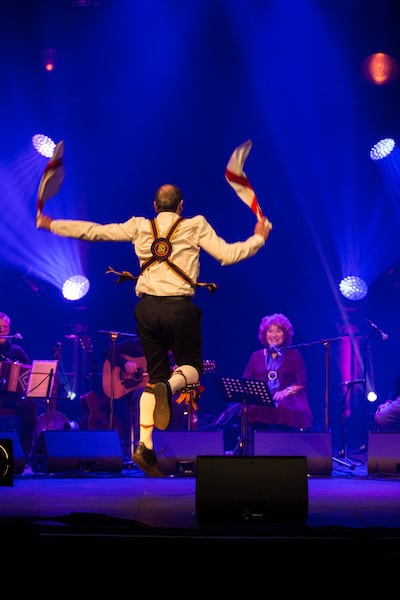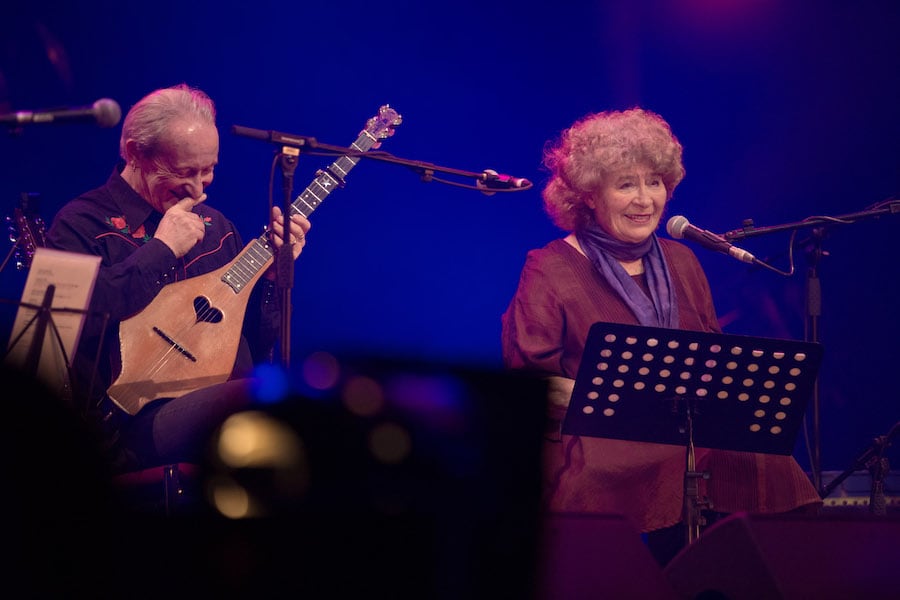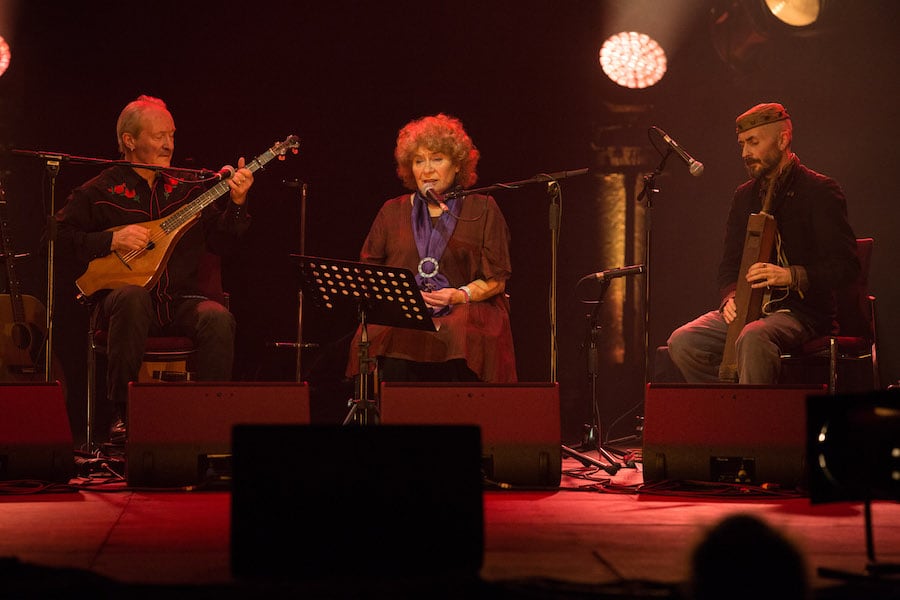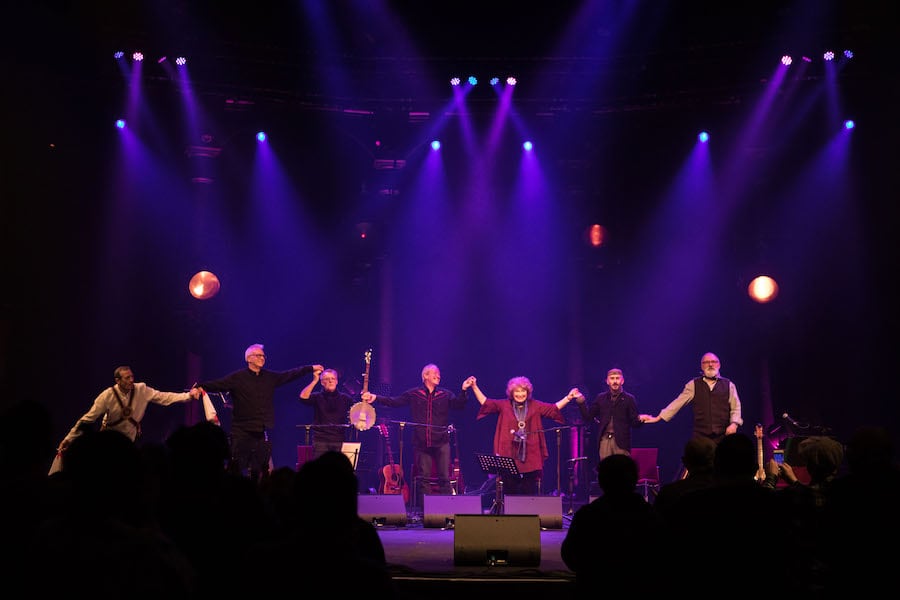Fifty years since she last performed live at The Roundhouse alongside her late sister Dolly, Folk’s grande dame Shirley Collins makes a triumphant return, evidentially having lost nothing in the art of stark storytelling over the preceding years.
Making our way down South the scene from our window is of a very bleak midwinter indeed. The sky a pallid grey shivers with wisps of settling static. The pained frames of beech and oak trees claw the air, whilst the furrows of fields seem to contort and strangle the land underlying.
“There’s never been a Merry England.” I turn over those words of Collins in my head, first heard during Rob Curry and Tim Plester’s feature-length documentary The Ballad Of Shirley Collins. The foreboding soundtrack of Lodestar and this barren picture before me both seem frozen in time. As the macabre drama unfolds the countryside seems to turn from a charming C.S. Lewis dreamscape to the chilling setting of a M.R. James tale.
Lodestar is unflinching and often gloriously gory, driven by Collins’ uncompromising spirit. She appears able to extract the eerie up from the earth and bear the lands ‘buried sufferings’, as author Robert Macfarlane once put it when discussing ‘the skull beneath the skin of the English countryside’ and our skewed pastoral vision. That said, for all it’s world-weariness it’s equally full of wonder.
Unlike her 1969 performance where she appeared alongside Deep Purple and Edgar Broughton to a nonplussed audience of Londoners, this evening she’s welcomed with open arms by fans young and old. Proudly she jokes about how she out-heckled one rowdy gig-goer that night, reminding us of last Friday’s no-nonsense Roundhouse star, Patti Smith. Both keen collectors, boldly upholding tradition in their own distinctive way, they own the stage with a humbling calm during their respective performances. Full of smiles for their supporting cast, they radiate warmth, embracing the listener and putting them at ease.
Awake Awake, the first in a run of tunes that opens Lodestar, sets things off. A descending mandolin line opens up to the gaping sustain of Ossian Brown’s hurdy-gurdy during The Split Ash Tree. Shirley’s voice is clear and bracing when she sings, “So repent, repent sweet England, for dreadful days draw near” words full of forewarning, that I’d imagine appeal to a few listeners fears as of late. Guitarist and accent-ace Pip Barnes does a wonderful job of giving the songs further context with his introductory narratives, like with his early origins account of the heartening Canadee-I-O.
Brown and Barnes join Dave Arthur and Steve Cooper, two parts of Rattle on the Stovepipe (this evening’s excellent support) to make up the Lodestar band, which is headed by musical director Ian Kearey. The band do a fine job of paying homage to Folk music collected from both sides of the Atlantic, with emphasis often on Shirley’s travels with Alan Lomax. On the defiant Pretty Polly, Collins’ recounts how she recorded a version of the song by Mrs Ollie Gilbert in Timbo, Arkansas and how much of a mouthful the tune is. She gets a hearty round of applause when she rattles off the most challenging verse. Later Kearey lets loose with a blinding Leadbelly slide-guitar number. Death & The Lady is another severe affair. Stripped back to just Kearey and Collins’, her trembling voice recalls a fatal encounter with the grim reaper.
Shirley has talked recently in interviews, the documentary and at length in her wonderfully insightful memoir, All In The Downs, about her Dysphonia (which saw her retreat from the limelight for almost forty years) and the importance for her to serve the song and its past singers above everything else:
“What I have in common with the older singers is the songs have been with me for a long time, they just come out. You don’t have to dramatise them because if you did it would sound embarrassing. It would sound crass. When I sing a song from an old farm labourer or from a tenant farmer he’s behind my shoulder when I’m singing always, you know, and I want to do my best for them, as well as for the songs”

Fans and journalists alike have spoken about how Collins now shares a great deal with those she once recorded whilst travelling across Southern America. As we learn more about her history, the more we recognise in her weathered voice what she’s been living with and through these songs all this time. Live, this only serves to enhance the melancholy and mystery of the material even more; the curious mix of world-weariness and innocence bowl you over. When solo Morris dancer Glen Redman turns to Collins who beaming away, impishly blows him a kiss, it is hard to imagine anyone who deserves to be on that stage more than Shirley Collins, as the ovations and cheering voices tonight will attest.
Photo Credit: John Williams



